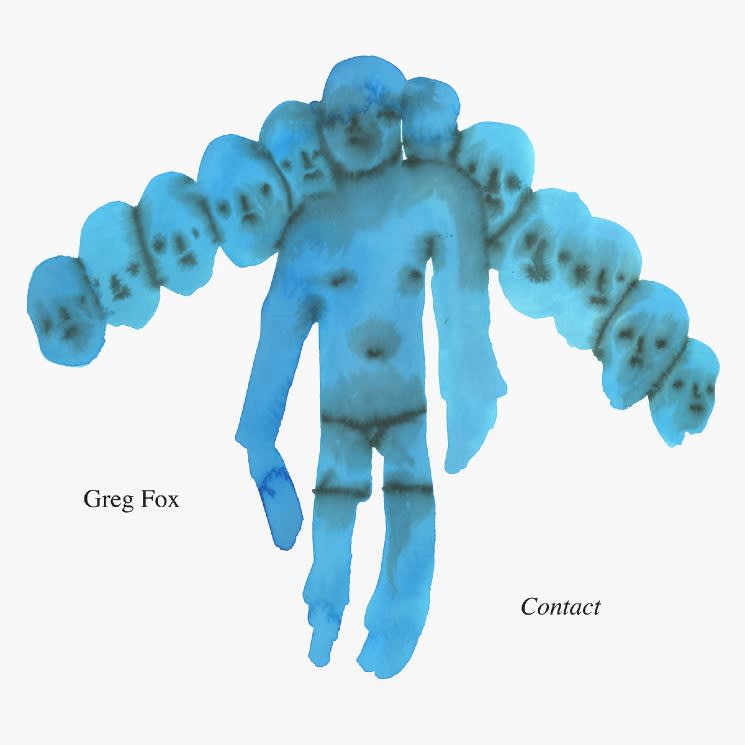Greg Fox is best known for lending his drumming to experimental metal acts such as Liturgy, Ex Eye and Uniform. Despite the (overstated) aggressiveness of that genre, Fox's rhythmic language has always erred on the meditative side. Even when beats were blasted, there was a circularity to the drumming reminiscent of a breathing exercise. His work on projects such as Guardian Alien and GDFX, where Fox has been increasingly able to showcase his abilities as a songwriter, swap the rigidity of metal drumming for fluidity without sacrificing that meditative quality. Contact, Fox's second release under his own name, references those rhythmic qualities to bring to sharper relief an aspect of his musical practice that has thus far felt latent — that it is fundamentally spiritual.
The album's transcendental elements can be traced in part to Fox's choice of instrumentation. 2017's The Gradual Progression launched Fox's relationship with Sensory Percussion, drum trigger technology that allows Fox to map various sounds to his drum kit and to activate them with unparalleled control over velocity and volume. The rhythmic vocabularies he had been honing were now able to break free from the constraints of mere percussiveness, taking on melody, harmony and texture as well.
While Contact's feel is undeniably influenced by Fox's increasing comfort with this technology, the album's success is far from reliant on it. On one end of the album's sonic spectrum lies the three "Contact" tracks, unadorned recordings of Fox at his drum kit that serve as the most unmediated reports of Fox's musical monologue. Listeners should resist the urge to treat them as palette cleansers. They feel like precious deliverances, communication from an individual in the way he knows and feels best.
The opposite end of that spectrum is occupied by album highlights "Ill Being" and "From the Cessation of What." Both tracks represent Fox at his most melodically and structurally sophisticated. The former's main melodic figure is the emotive pinnacle of Contact and a moment surely aided by Fox's increased ability to graft synths to his drum hits. From the Cessation of What" benefits immensely from the sounds used, but it is Fox's ear for arrangement that elevates it.
Between Fox at this most stripped back and Fox at his most ornate are "Vedana," "Arising and Passing" and "Parasthesia," which mostly eschew the stream of consciousness rhythms and melodic flourishes of the rest of Contact for a more pensive feel, replete with drones, tuned percussion, and tantric textures. These tracks aren't ineffective so much as they are on a different plane from the rest, one less ecstatic and adventurous. It's a shame they take up so much of the record's Side A as a different sequencing could have primed listeners to better appreciate these songs.
For all of the tonal and structural maturity displayed on Contact, the album's epicentre remains Fox's perfectly placed bass drum throughout "Ill Being." These are subtle moments from a drummer who understands the impact of restraint, even when it's a flurry of drum hits that is the expected star of the show.
(RVNG Intl.)The album's transcendental elements can be traced in part to Fox's choice of instrumentation. 2017's The Gradual Progression launched Fox's relationship with Sensory Percussion, drum trigger technology that allows Fox to map various sounds to his drum kit and to activate them with unparalleled control over velocity and volume. The rhythmic vocabularies he had been honing were now able to break free from the constraints of mere percussiveness, taking on melody, harmony and texture as well.
While Contact's feel is undeniably influenced by Fox's increasing comfort with this technology, the album's success is far from reliant on it. On one end of the album's sonic spectrum lies the three "Contact" tracks, unadorned recordings of Fox at his drum kit that serve as the most unmediated reports of Fox's musical monologue. Listeners should resist the urge to treat them as palette cleansers. They feel like precious deliverances, communication from an individual in the way he knows and feels best.
The opposite end of that spectrum is occupied by album highlights "Ill Being" and "From the Cessation of What." Both tracks represent Fox at his most melodically and structurally sophisticated. The former's main melodic figure is the emotive pinnacle of Contact and a moment surely aided by Fox's increased ability to graft synths to his drum hits. From the Cessation of What" benefits immensely from the sounds used, but it is Fox's ear for arrangement that elevates it.
Between Fox at this most stripped back and Fox at his most ornate are "Vedana," "Arising and Passing" and "Parasthesia," which mostly eschew the stream of consciousness rhythms and melodic flourishes of the rest of Contact for a more pensive feel, replete with drones, tuned percussion, and tantric textures. These tracks aren't ineffective so much as they are on a different plane from the rest, one less ecstatic and adventurous. It's a shame they take up so much of the record's Side A as a different sequencing could have primed listeners to better appreciate these songs.
For all of the tonal and structural maturity displayed on Contact, the album's epicentre remains Fox's perfectly placed bass drum throughout "Ill Being." These are subtle moments from a drummer who understands the impact of restraint, even when it's a flurry of drum hits that is the expected star of the show.
